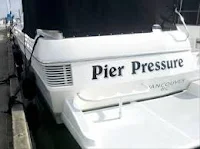Often times a subject to espouse upon just comes to the wordsmith. Case in point, while attending a recent conference in San Diego on the utilization of technology in education, J actually went and learned a thing or two about the value of technology.
What he took away was simple - as long as education pushes technology that is fine and beneficial for the student, but when technology pushes the use of technology for technology's sake then the concept of learning to gain knowledge no longer exists.
His words, not the presenters, at the Innovation Summit.
 |
| This is actually rather creepy! |
Tens of millions of dollars worth - probably more - of every make and year of vessel resting gently on the waters of the San Diego Bay while tightly secured by mooring lines attached to the floating docks.
 |
| Lots and lots of money in boats in San Diego! |
While enjoying the afternoon sun, J started to ponder the various names on the aft section of the boats. It seemed that every yacht was named this or that - not really 'this' or 'that' but a name which must have been dear or at least meant something to the owner of the yacht.
Then the question arose during that leisurely stroll - why were boats named and those names forever painted on the rear end of the boat? People didn't name their cars in the same fashion. People didn't name their RV's - motorhomes or travel trailers in the same fashion. People didn't place large letters on the side of their homes in the same fashion.
 |
| Oh, Captain - that does not work anywhere |
This called for research - that's what we do here.
Seems there is no definite time when seafarers started naming boats but it goes back to the idea of identity. Before the invention of instantaneous communication - that technology thing - people needed to know what boat a person was traveling on. You couldn't just say, "I'll be on the wooden boat with masts in the harbor." That really wouldn't have helped anyone in Boston in 1790 when all boats were wooden with masts now would it?
 |
| Uh - we're on the third boat to the left - can't miss us |
So, slap a name on the rear of the boat and voila you knew where the person you were looking for was.
The love of naming boats never went away even when satellite phones came into existence and a person could talk to someone on the 'Big Kahuna' half way between Los Angeles and Honolulu.
One reason, and this could just be myth, is that naming a boat is good luck and not is not - good luck that is.
Somewhere back in the day (not sure what that means but heard a lot of that terminology at the conference - "back in the day when rotary phones made sense . . . ") people believed that the gods of the oceans, Poseidon or Neptune (choose your culture) kept a ledger of every ocean bearing boat that sailed. A name meant the boat was being watched over by either one of these two gods and that was a good thing.
 |
| Better name your boat and give me a drink while you're at it! |
So, name the boat and the captain and crew were probably safe except for possible hurricanes, monsoons, typhoons, rogue waves, pirates, running aground, and the occasional sea monster.
 |
| Technology is everywhere |
An example to illustrate the point - a husband wants to purchase a yacht for his spouse for her birthday. A lovely thought but it would be unwise to give her a vessel with another woman's name on it. That could entail, depending on the strength of the marriage, disagreements or even yelling about what he was thinking?
 |
| Original thinking - yes |
Can a boat's name be changed the husband would ponder prior to leading his lovely spouse down the gangway to view her new expensive gift? The answer is yes - - but there are a couple things that need to be done first.
 |
| Original thinking - probably not |
All mention or telltale visage of the former boat's name must be vanquished. Get rid of every shred of evidence that boat was ever named anything but what the current name is to be. Be thorough - very thorough. Change the name on every legal and non-legal document.
Then and only then can the boat be renamed - Poseidon and/or Neptune will then wipe out the old name from their ledger and replace it with the new name and all will be well.
Forget to do this and the boat will sink and all will drown. Okay - maybe not but perhaps the motor will break or the BBQ will fall overboard with the night's dinner firmly attached to the grill.
Oh yes, there's some sort of ceremony and chants to the sea gods that go along with the whole ritual and even pouring libations into the surrounding waters to appease the alcoholic gods. So, chant away "Oh mighty and great ruler of the seas and oceans - blah, blah, blah," and pour away to rid your boat of any bad karma.
We at J and L highly recommend being a bit stingy on the pouring and then empty the bottle into two crystal flutes and toast the newly named yacht.
Just our opinion.
 |
| Not enough chanting or booze obviously |















